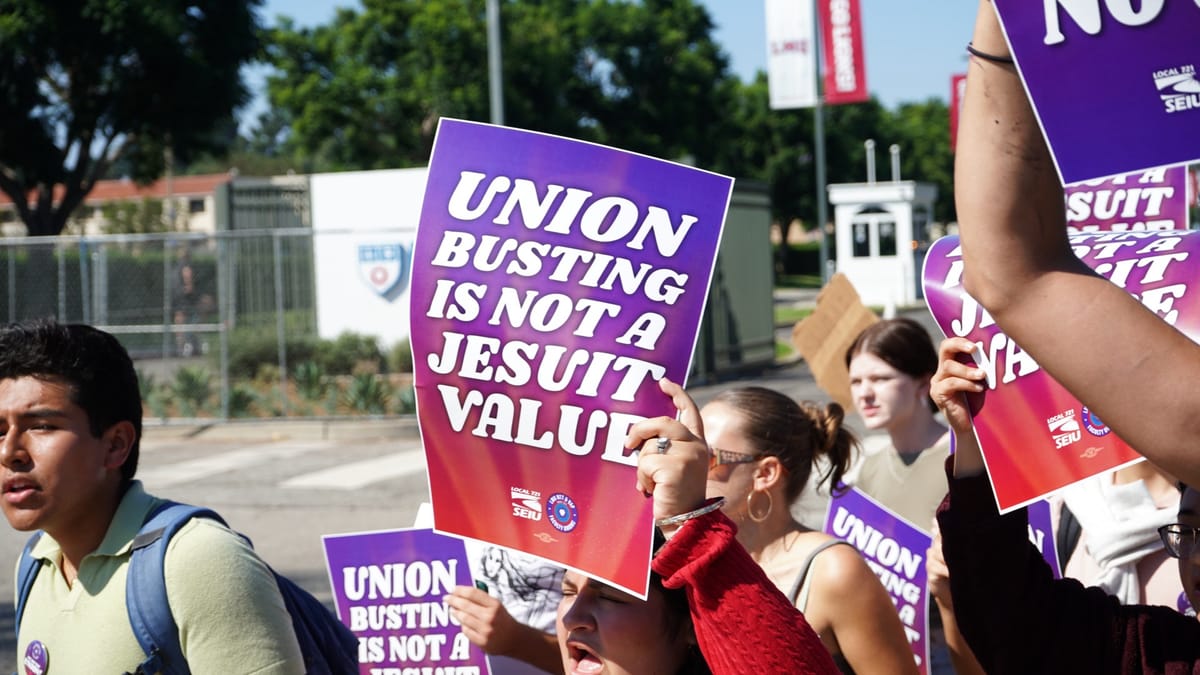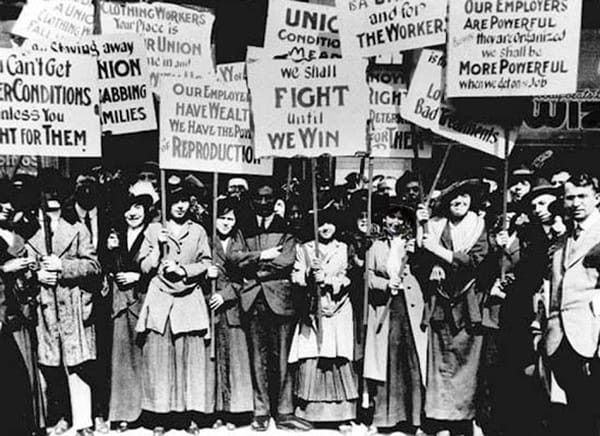Loyola Marymount University claims religious exemption with the NLRB, claws back recognition of NTT faculty union
The sudden decision of the LMU Board of Trustees has left many NTT faculty in shock; the union plans a response.

Late last week, non-tenure track faculty members at Loyola Marymount University, a Catholic university based in Los Angeles, received notification from the LMU Board of Trustees that they would stop recognizing their union and cease bargaining effective immediately. The NNT faculty unit is represented by Service Employees International Union (SEIU) Local 721, and had been in the midst of bargaining for nearly all of 2025. Over 400 workers won their union election last year.
In an email to LMU employees and students Sept. 12, Paul S. Viviano, chairman of the LMU Board of Trustees and CEO of Children’s Hospital Los Angeles, said the Loyola Marymount University would stop recognizing the NTT faculty members’ union and invoke its “constitutionally protected religious exemption” from the jurisdiction of the National Labor Relations Board (NLRB), which governs collective bargaining for private employers.
“It was a massive shock because I would not have expected them to do something so outrageously disrespectful and illegal.”
Bryan Wisch, NTT Faculty and Bargaining Team Member
“Earlier today, LMU board chair Paul Viviano shared a message regarding the decision of the LMU Board of Trustees to invoke LMU’s religious exemption as it relates to labor organizing activities on our campuses. This means LMU will no longer recognize the unions or participate in collective bargaining,” LMU President Thomas Poon said in a video released on Friday. “The religious exemption protects our distinctive Catholic mission and ensures an LMU education remains accessible for generations to come. This decision safeguards our autonomy to carry out our mission without a third party that may not share our values. The LMU board views the religious exemption as necessary to protect the university’s ability to educate and serve students.”
LMU administration pointed toward what they characterize as “unrealistic” economic proposals as a main driver of invoking the religious exemption. “The unrealistic demands from SEIU proved financially unsustainable and would have diverted significant resources away from students and undermined LMU's ability to sustain its mission,” it said on a website set up in the wake of the decision.
Bryan Wisch, bargaining team member for LMU non-tenure track faculty, reported to Words About Work yesterday that LMU administrators never even brought counterproposals to the table for their economic prerogatives. “They never gave us any economic counters. None, not a single one, in eight months of bargaining,” he said. “We put out some aggressive opening proposals because we knew we were going to have to compromise, right? Like it wasn’t like we just expected the university to accept all of our initial proposals as is.”
Non-tenure track faculty at the university were shocked by the sudden reversal, and the union plans to file a ULP over the decision. “It was a massive shock because I would not have expected them to do something so outrageously disrespectful and illegal,” Wisch said.
Union-busting for God?
On their website, The Path Forward, LMU administrators explained their decision as important to the mission of the university. “Guided by our Catholic, Jesuit, and Marymount mission, we are strengthening shared governance, investing in our people, and safeguarding the distinctive culture and values that define our community,” the home page says.
The move by LMU administrators is seen by many as incompatible with Catholic Social Teaching, which has for over a century championed the rights of workers to freely associate and form unions. Representatives of The Catholic Labor Network, a Catholic nonprofit that seeks to advance the tenets of Catholic Social Teaching as it relates to workers and the dignity of work, were “very concerned” by the actions taken by LMU administrators. “Catholic Social Teaching from the time of Pope Leo XIII’s 1891 Encyclical Rerum Novarum has been very clear: workers have the right to organize in trade unions to bargain collectively,” Clayton Sinyai, Labor Advisor for the Catholic Labor Network, said via email. The Rerum Novarum is an encyclical issued by Pope Leo XII in 1891 that addressed the condition of the working class.
In the Compendium of the Social Doctrine of the Church, compiled by the Pontifical Council of Justice and Peace to Pope John Paul II, a document that sought to organize the bulk of the Church’s social teachings for the benefit of its membership, the church makes clear its stance on workers’ rights and the right to form unions, saying,
305. The Magisterium recognizes the fundamental role played by labour unions, whose existence is connected with the right to form associations or unions to defend the vital interests of workers employed in the various professions. Unions “grew up from the struggle of the workers — workers in general but especially the industrial workers — to protect their just rights vis-à-vis the entrepreneurs and the owners of the means of production”.[667] Such organizations, while pursuing their specific purpose with regard to the common good, are a positive influence for social order and solidarity, and are therefore an indispensable element of social life. The recognition of workers' rights has always been a difficult problem to resolve because this recognition takes place within complex historical and institutional processes, and still today it remains incomplete. This makes the practice of authentic solidarity among workers more fitting and necessary than ever.
“Lest there be any confusion, in 1986 America’s bishops issued a pastoral letter on the economy called Economic Justice for All, which explicitly said that employees of Church institutions enjoy this right just as those working for secular, for-profit organizations do,” Sinyai continued. “Indeed, I find the administration’s legal stance unbelievably cynical. By claiming a religious exemption from the NLRA to bust the faculty union, they are arguing that LMU is both too religious to fall under the jurisdiction of the NLRA yet not religious enough to honor Catholic Social Teaching in this matter on their own accord.”
“It’s clearly just an attempt to deny us our right to unionization,” Wisch said. “It’s so patently ridiculous that the university didn’t even really try to justify it beyond saying that they are invoking their religious exemption to preserve the mission of the school.”
Words About Work reached out to the Archdiocese of Los Angeles for comment, but did not receive a response by the time of publication.
A union undeterred, and ready to fight
On Sept 16, dozens of students and faculty members descended upon the LMU campus ahead of a proposed town hall to rally in support of the embattled faculty and voice their displeasure at the administration’s decision. Chants of “What do we want? To bargain!” rang through the neighborhood as they picketed outside the campus gates.
Workers are determined to fight the administration’s decision and are encouraged by the show of support from students. “I met with student groups today ahead of this rally,” Wisch said. “I’m encouraged by their response.”
This is a developing story.




